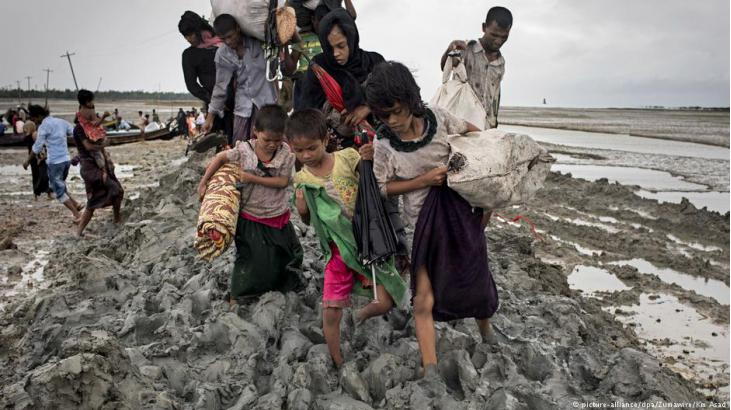The campaign of ethnic cleansing now being carried out against Myanmar′s Rohingya confronts the world with one of those moments that seem to arrive unannounced. Surely, by now, we should be able to recognise in such episodes the accelerating pulse of genocide? By Bernard Henri-Levy
As is so often the case, it was an artist who sounded the warning. His name is Barbet Schroeder and the alert that he issued came in the form of his fine, sober film “The Venerable W.”, a portrait of Myanmar′s Buddhist monk Ashin Wirathu. Known as ″W″, Wirathu is the other face of a religion that is widely perceived as the archetype of peace, love and harmony. And behind his racist visage lies a broader Buddhist embrace of violence that takes one′s breath away.
Shown at the 2017 Cannes Festival, Schroeder′s film attracted an impressive amount of media attention. And, in a subsequent television appearance, Schroeder warned that the Rohingya, the Muslim minority in Myanmar′s Rakhine State, lay in the sights of Wirathu′s bloodthirsty ″969 Movement″.
That should come as no surprise. The Rohingya are a million men and women rendered stateless in their own country. Deprived of the right to vote, of political representation and of access to hospitals and schools, they have faced pogroms whenever the military that has tyrannised Myanmar for a half-century has tired of starving them.
The Rohingya′s unique status is stunning in its calculated cruelty. They are simultaneously rootless (officially unrecognised in a country so obsessed with race that it counts 135 other ″national ethnicities″, making them literally one race too many) and root-bound (legally barred from moving, working, or marrying outside their village of origin and subject to restrictions on family size).
From sub-human to hunted animal
So here we are, confronted with one of those moments that seem to arrive unannounced but that, by now, we should be able to recognise as the accelerating pulse of genocide.
Nearly 400,000 people have now been transferred from the realm of subhumans to that of hunted animals, smoked out of the villages to which they had previously been confined, driven out on the roads, shot at, tortured for fun and subjected to mass rape. Those who survive are arriving at makeshift camps just across the border in neighbouring Bangladesh, which, as one of the world′s poorest countries, lacks the resources, though not the will, to offer proper shelter to the swelling ranks of refugees.
The United Nations, overcoming its customary pusillanimity, has drawn on what remains of its moral capital to condemn these crimes, declaring the Rohingya the world′s most persecuted minority. For those inclined to see and remember, the situation in Rakhine State recalls the ethnic cleansing that occurred in the former Yugoslavia in the 1990s and the even worse massacres in Rwanda in the same decade.
But many are not inclined to see. Because the Rohingya′s persecutors, by restricting access to journalists and photographers, have denied their victims a face and because the Rohingya are Muslims at a bad time to be Muslim, nearly the entire world is turning a blind eye.
″Unused knowledge and a passion for ignorance″
Confronted with this tragedy foretold, the world should meditate on what my late friend, the philosopher Jean-Francois Revel, called unused knowledge and the passion for ignorance.
We should curse the naivete that led many, including me, to sanctify the ″Lady of Rangoon″, Aung San Suu Kyi, herself the subject of a film, this one intended to be hagiographic but, in hindsight, appalling. Since becoming Myanmar′s de facto leader last year, Suu Kyi has abandoned the Rohingya to their fate.
Suu Kyi seemed to deserve the Nobel Peace Prize that she won in 1991, when she appeared to be the reincarnation in one body of Nelson Mandela, Mahatma Gandhi and the Dalai Lama. But from the moment when she solemnly assured the world that she had seen nothing in Sittwe, that nothing had happened in the rest of Rakhine State and that the string of alarming reports to the contrary was just the ″tip of an iceberg of disinformation″, her Nobel Prize became an alibi.
The Rohingya are the latest cohort of the existentially naked: people dispossessed of everything (including their own death), shut out of the human community and thus stripped of rights. They are the people Hannah Arendt predicted would become fixtures of humanity′s future, living (or living dead) reproaches to hollow declarations of human rights.
Bernard Henri-Levy
© Project Syndicate 2017


